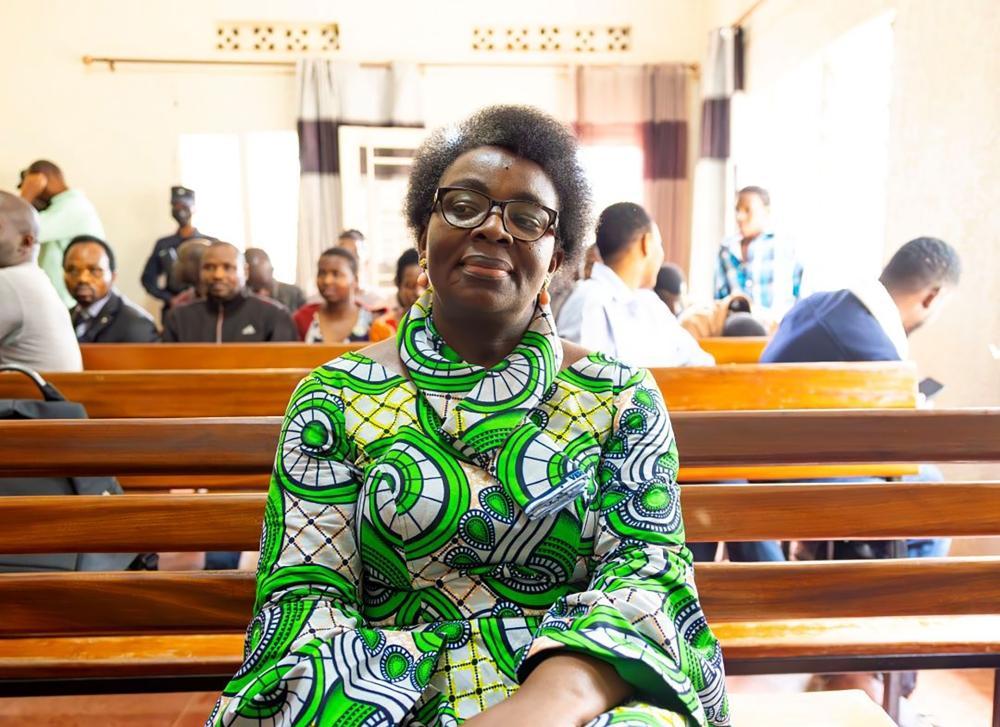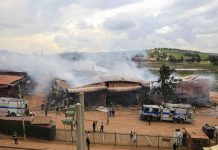Africa-Press – Rwanda. The Kicukiro Primary Court has commenced hearings in the pre-trial detention case of Victoire Ingabire Umuhoza, who faces a series of criminal charges.
Ingabire is accused of offenses ranging from spreading false information to conspiracy against state security. The Prosecution has presented its argument for her continued detention pending trial, while Ingabire and her lawyer deny the charges and argue for her release on bail.
Here are five key highlights from the ongoing proceedings:
1. Objections over legal representation and case legitimacy
From the start of the hearing, Ingabire’s lawyer Gatera Gashabana, raised a series of procedural objections. Among them was the question of legal representation. Gashabana argued that Ingabire’s right to a fair trial had been compromised by the Rwanda Bar Association’s refusal to approve her chosen legal counsel. He maintained that this decision violated both domestic legal provisions and international standards on the right to a defense.
Ingabire echoed her lawyer’s concerns, telling the court, “I agreed to appear in court, but my right to do so was denied because some legal provisions were ignored, and the Bar Association refused to authorize the lawyer meant to represent me.”
The defense also challenged the legitimacy of the charges, arguing that the case had remained dormant for over four years before resurfacing, raising concerns about judicial impartiality. Citing Articles 3, 29, and 145 of the Constitution, Gashabana argued that such delays suggested possible interference with the independence of the judiciary and the prosecution.
In response, the prosecution defended its position, citing Article 106 of the Code of Criminal Procedure, which allows courts to instruct further investigations when new information becomes known. They insisted that there had been no interference, and that the court had merely recommended further inquiry, not detention or arrest, at the time the case was initially discussed.
The court finally ruled that the procedural objections raised by the defense would be evaluated alongside the main arguments supporting or opposing pre-trial detention.
2. Ingabire faces six charges
The Prosecution has leveled six formal charges against Ingabire and these include: establishing or joining a criminal organization, conspiring to commit crimes against the government, and inciting unrest or disorder among the population.
Resisting legal authority, organising or participating in unlawful meetings or demonstrations, and spreading false information or harmful propaganda to discredit the government abroad.
Additionally, the Prosecution has invoked Article 39 of the Cybercrime Law, which deals with the dissemination of false or harmful content online.
Asked to respond to these accusations, Ingabire firmly stated, “I deny all charges. I am a mother, a Rwandan, and a politician. I do not wish any harm to my country.”
3. How the alleged offenses were committed
The charges stem from a broader investigation in which several people, including Sylvain Sibomana, former national coordinator of Ingabire’s unregistered party DALFA-Umurinzi, are accused of endangering state security.
The Prosecution alleges that Ingabire secretly supported and facilitated an English language-training programme that served as a front for subversive mobilisation. The sessions, conducted on encrypted platforms like Jitsi Meet, reportedly included training on non-violent resistance tactics, based on materials authored by Serbian activist Srdja Popovic.
Participants used aliases such as “Zero,” “Blessing,” and “Turkey.” According to the Prosecution, these sessions were led by foreign trainers and involved discussions about strategies to destabilize the government.
Financial records and WhatsApp communications allegedly show that Ingabire played a central role in organising these sessions.
Boniface Nzabandora, a former employee of Ingabire, is said to have grown suspicious and begun collecting evidence, which he later submitted to authorities. Further claims link Ingabire to earlier insurgent activities, including ties to the P5 coalition and RUD-Urunana, which carried out the 2019 Kinigi attacks that left 15 civilians dead.
4. Prosecution’s evidence and alleged connections to past insurgency
The Prosecution claims that audio recordings, testimonies, and digital records implicate Ingabire in plans to undermine state authority. Audio files from September 2021 allegedly capture online training sessions led by a woman named “Sandra,” in which participants were coached on non-violent uprisings. One session reportedly referenced SRDJA Popovic’s guide on regime change.
More evidence includes conversations from 2020 in which Ingabire allegedly discussed military training with Cassien Ntamuhanga, a controversial figure previously convicted for terrorism-related activities.
Prosecutors also argue that she incited unrest by planning demonstrations in Kigali, notably at the “Kwa Rubangura” location. Several witnesses stated that Ingabire provided them with smartphones and data bundles to participate in training sessions and disseminate protest messages under the guise of civic advocacy.
Furthermore, she is accused of organizing food distributions during the COVID-19 pandemic as a front for unauthorized gatherings meant to generate international media attention. Her televised statements and publications on Umubavu TV were cited as examples of alleged harmful propaganda.
5. Ingabire denies charges and requests bail
Ingabire has denied all charges and, through her lawyer, applied for bail. She dismissed claims that she sponsored or attended any of the alleged training sessions. Regarding the issue of supplying phones to participants, she stated that this was part of her party’s communication strategy, not evidence of wrongdoing.
She also challenged the relevance of audio recordings and digital evidence gathered years earlier, asserting that charges based on such information should have been filed promptly.
According to Ingabire, she was questioned on the same matters in 2021, and the Prosecution had at the time opted not to pursue charges, an indication that the current action is not grounded in new facts.
“My address is known, and I have complied with all parole conditions since my release,” she stated, adding that she returned to Rwanda of her own will and has no plans to flee. “I would rather go to prison than live abroad again.”
Her lawyer emphasised her consistent cooperation with judicial authorities and requested that she be granted bail while awaiting trial.
The verdict for her bail ruling is expected to be delivered on July 18
For More News And Analysis About Rwanda Follow Africa-Press






